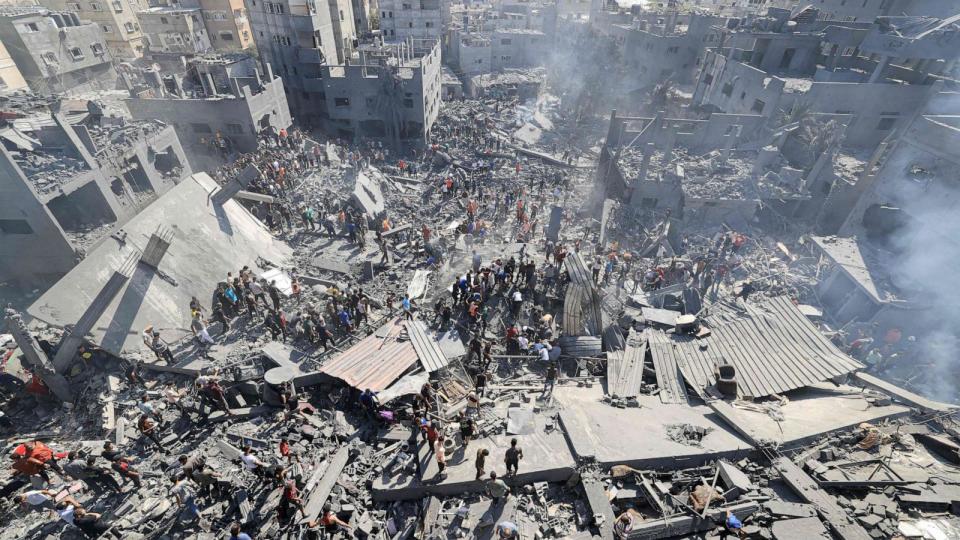What a potentially wider Israel-Hamas war could mean for the US economy, already facing pocket-book stressors

A potential escalation of the Israel-Hamas war and the possibility that it could widen into a regional conflict could send gas prices above $5 a gallon, trigger an overall surge of inflation and plunge the U.S. economy into a recession, economists and oil industry analysts told ABC News.
A conflict that ensnares the Middle East could send oil prices soaring, which in turn would hike costs not only for gasoline but also for many consumer products that depend on diesel and jet fuel for transport, the experts said.
In the event, for example, of a potential outcome that puts Israel in direct conflict with Iran, a major oil producer, the resulting price shock could cause a U.S. economic downturn that triggers layoffs, they added, noting that significant uncertainty remains about the potential scope of the war and its economic implications.
"It would probably push the U.S. economy into a ditch," Stewart Glickman, an analyst at research firm CFRA, told ABC News, describing a scenario in which the war escalates to involve Iran.
"Everywhere you look, it will be more expensive," Glickman added. "It will feel like a really strong tax on our pocketbooks."
In response to the surprise attack by Hamas terrorists on Oct. 7 -- which killed more than 1,400 people, according to Israeli officials -- Israel has responded with a campaign of airstrikes in Gaza and called up 360,000 military reservists for a possible ground invasion.
More than 6,500 people have since been killed in Gaza, according to the Hamas-run Gaza Health Ministry.
Meanwhile, fighting has broken out elsewhere in the region. Israel has engaged in skirmishes with Hezbollah militants along its northern border with Lebanon, resulting in deaths on both sides, according to the Israeli military and Hezbollah. In addition, Israel has carried out airstrikes in Syria, targeting locations such as airports, according to Syrian state media.

The U.S. is "concerned" the war between Israel and Hamas could spill over into a broader conflict throughout the Middle East, Defense Secretary Lloyd Austin said Sunday.
Top economic policymakers have echoed unease about the implications of a broader conflict.
"Geopolitical tensions are highly elevated and pose important risks to global economic activity," Federal Reserve Chair Jerome Powell said in New York City on Friday, citing the war in Israel and Gaza.
At the International Monetary Fund's annual meetings in Morocco earlier this month, Treasury Secretary Janet Yellen downplayed the global economic impact of the war. But, she told Bloomberg, "It's critically important that the conflict not spread."
If the war expands to the point of direct intervention from Iran and the United States, it would bring "severe" global economic consequences, spiking the price of oil to more than $150 a barrel and slowing economic activity as consumers and businesses contend with elevated prices, Gregory Daco, chief economist at consulting firm EY, told ABC News.
Such an outcome could reduce U.S. inflation-adjusted GDP growth over a year-long period by 1.2%, which amounts to $500 billion in lost production, Daco said.
As the U.S. contends with persistently high inflation and a near-historic rise in interest rates, the economic vulnerability puts the nation at risk of a recession triggered by the Israel-Hamas war, he added.
"Consumers have a lot of domestic concerns right now, but we also know how rapidly geopolitical developments can evolve," Daco said.
As the U.S. economy weathers current difficulties, Daco added, "any form of shock could have a larger effect on the economy and consumers."

A U.S. Navy destroyer in the northern Red Sea shot down multiple missiles and drones launched by Iranian-backed Houthis in Yemen last Thursday. The Pentagon said the drones were potentially headed toward targets in Israel.
During the previous week, Houthi leader Abdul-Malek al-Houthi said that if the U.S. directly intervened in the Israel-Hamas conflict, his group would respond by firing drones and missiles, and take other military options.
Iran, which intelligence officials say funds Hamas and Hezbollah, has denied involvement in the initial Hamas surprise attack. Israel and the U.S. have both said that they do not have any hard evidence of a direct Iranian role in the attack.
To be sure, experts couched their economic forecasts with disclaimers about a wide range of outcomes for the war.
The White House is counseling Israel to delay a ground invasion of Gaza, an administration official told ABC News.
The Biden administration has yet to publicly confirm that advice, but National Security Council spokesperson John Kirby said on Tuesday the U.S. has been communicating with Israel from the start about strategies and goals in responding to Hamas' unprecedented terror attacks.
And those conversations, he said, include asking Israel "tough questions" about what he called the potential "unintended consequences" of a larger military operation.
Gian Maria Milesi-Ferretti, a senior fellow in economic studies at the Brookings Institute's Hutchins Center for Fiscal and Monetary Policy, acknowledged in a research note the possible repercussions of "intensification" but warned observers to bear in mind "the extreme uncertainty characterizing the situation."
Moreover, some analysts said that the Israel-Hamas conflict will impose little damage on the global or U.S. economy.
"While we and investors must remain vigilant regarding those risks, we do not believe that the conflict in its current form is likely to have significant impacts on global economic growth," investment firm Franklin Templeton said last week.
But, Franklin Templeton added, the region "remains fraught with uncertainty, and escalation can never be ruled out."
- Questions and Answers
- Opinion
- Story/Motivational/Inspiring
- Technology
- Art
- Causes
- Crafts
- Dance
- Drinks
- Film/Movie
- Fitness
- Food
- Jogos
- Gardening
- Health
- Início
- Literature
- Music
- Networking
- Outro
- Party
- Religion
- Shopping
- Sports
- Theater
- Wellness
- News
- Culture
- War machines and policy

